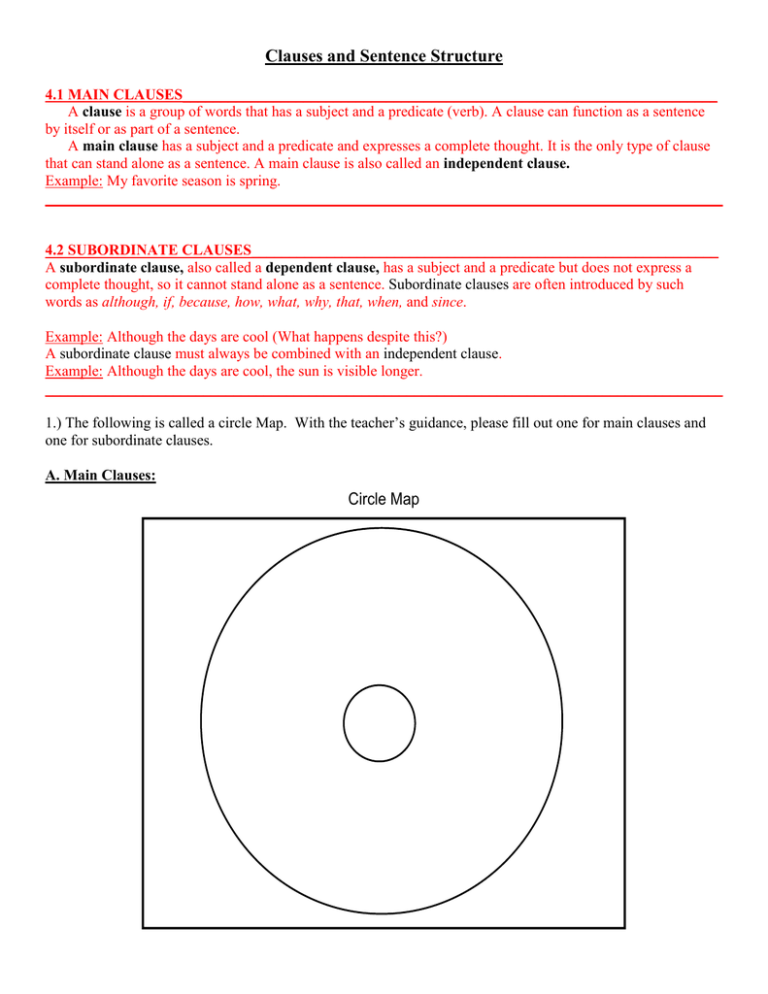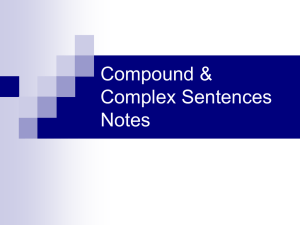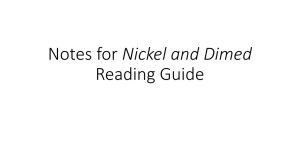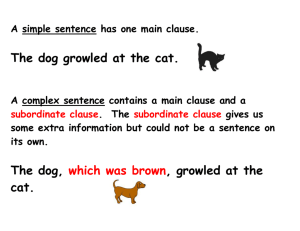Clauses and Sentence Structure
advertisement

Clauses and Sentence Structure 4.1 MAIN CLAUSES_______________________________________________________________________ A clause is a group of words that has a subject and a predicate (verb). A clause can function as a sentence by itself or as part of a sentence. A main clause has a subject and a predicate and expresses a complete thought. It is the only type of clause that can stand alone as a sentence. A main clause is also called an independent clause. Example: My favorite season is spring. __________________________________________________________________________________________ 4.2 SUBORDINATE CLAUSES______________________________________________________________ A subordinate clause, also called a dependent clause, has a subject and a predicate but does not express a complete thought, so it cannot stand alone as a sentence. Subordinate clauses are often introduced by such words as although, if, because, how, what, why, that, when, and since. Example: Although the days are cool (What happens despite this?) A subordinate clause must always be combined with an independent clause. Example: Although the days are cool, the sun is visible longer. __________________________________________________________________________________________ 1.) The following is called a circle Map. With the teacher’s guidance, please fill out one for main clauses and one for subordinate clauses. A. Main Clauses: Circle Map B. Subordinate Clauses: Circle Map 2.) The following is called a double-bubble map. With the teacher’s guidance, please it fill out. Double Bubble Map Practice Identifying Main/Independent and Subordinate/Dependent Clauses Identify each boldfaced group of words by writing IND for independent clause or SUB for subordinate clause. 1. A full moon appears larger as it emerges from behind clouds. _____ 2. The housefly has five eyes, which are located on the upper part of its head. _____ 3. While red lights repel birds, white lights attract them. _____ 4. The campers learned what the poison ivy vine looks like. _____ 5. What bedtime story will you tell the children if they stay up late? _____ 6. When Peter changed his clothes for the party, he forgot to comb his hair. _____ 7. While I wash the dishes, you set the table. _____ 8. He may not be home when you call. _____ 9. Li can’t go to the park this afternoon because she is going to the art fair. _____ 10. If it rains, Sam has an extra umbrella. _____ Practice Revising The following paragraph has no capitalization to mark sentence beginnings, or end marks to indicate their endings. Insert a period after the last word of each sentence, and mark the first letter in each sentence with a triple underscore, the proofreading symbol for capitalization. When you are finished, write the number of sentences that combine both an independent and a dependent clause. Number of sentences with both an independent and a dependent clause: _____ Before weather forecasters used satellites and radar, people looked for clues in nature for predicting the weather since people did not have sophisticated equipment, they watched the behavior of animals, birds, and insects some signs are reliable, but others should not be trusted here are some examples of what people once believed if you can see a groundhog’s shadow on February 2, there will be six more weeks of winter when the sky is red at sunset, good weather will follow when the sky is red at sunrise, the weather can’t be trusted Germans kept frogs to predict rain because frogs croak more in low air pressure pinecones have been used to forecast weather because they open up in dry weather they close up when the weather is damp we are lucky that weather forecasting techniques have improved. Practice Identifying Main/Independent and Subordinate/Dependent Clauses. Underline the main/independent clause once and the subordinate/depeendent clause twice. 1.) I will help you with your chemistry homework whenever you ask. 2.) We scolded the puppy that chewed up the shoes. 3.) George Miller, my dentist, is a very rich man because his clients have very bad teeth. 4.) While I studied for English class, my mother made me dinner. 5.) I am taking Art History because I want to work in an art gallery when I graduate. 6.) Whenever lazy students whine, Mrs. Russell throws chalk erasers at their heads. 7.) Anthony ran for the paper towels as cola spilled over the glass and splashed onto the counter. 8.) Because my dog loves pizza crusts, he never barks at the deliveryman. 9.) The door opened because the man pushed it. 10.) Since I started doing my homework on a regular basis, my grades have gone up considerably.




